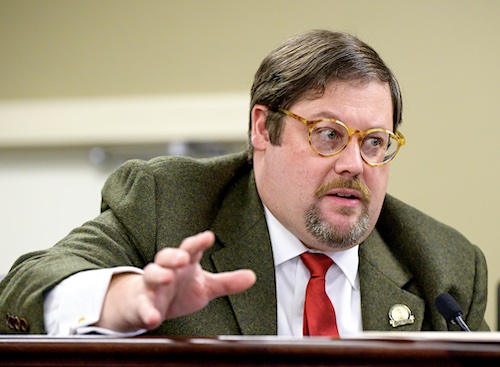SENATOR PHILLIP WHEELER’S LEGISLATIVE UPDATE

Week 12 of the 2024 Legislative Session
Spring has arrived here in the Bluegrass State, and we find ourselves in the final stages of the 2024 Regular Session. With only a few legislative days remaining and sine die on the horizon, the Kentucky General Assembly remains fully committed to the important work of shaping the future of our commonwealth.
At the forefront of our legislative efforts are ongoing budget deliberations, where we meticulously allocate resources for the upcoming two-year biennial budget. This process demands careful consideration and thorough debate to ensure that every dollar is utilized wisely and responsibly for the betterment of all Kentuckians. Simultaneously, we are taking advantage of the extended daylight hours by wrapping up final committee hearings and floor activity, pushing forward essential bills addressing a wide range of issues from education and health care to infrastructure and more.
The following bills were approved in the Senate this week:
SJR 58 is our annual road-naming resolution to honor deceased individuals who have made a substantial contribution to the commonwealth by designating a road or bridge in their memory. This year, I chose to honor three important individuals who made substantial contributions to the 31st Senate District. In Pike County, I honored Ritchie Weems and the Continental Five by adding their names to the Pike County Country Music Highway Marker on US Highway 23. Weems and the Continental Five were one of the first integrated rock ‘n’ roll groups and made history with their hit single “Natural Born Man” that made number 52 on Billboard’s Top 100 chart in 1963.
The next individual honored was PFC Larry Gene Ratliff from Martin County. He grew up in Martin County, rode the Martin County school buses, and attended Martin County schools. As an exceedingly capable student, Larry eagerly participated, along with his classmates at Inez High School, in such extracurricular activities as the rifle team. His tactical skill and determination were largely responsible for the championship for his intramural basketball team in the year-end tournament his senior year at Inez High. Quiet strength was his trademark, and he was always willing to do more than his part in any venture. Larry’s family and friends were shocked beyond belief when just 54 days after reporting for duty, the tragic news came that Larry had been killed by hostile action and became the fourth Martin County casualty of the Vietnam War.
The final designation is for a bridge on US Highway 23 in Johnson County in honor of former State Rep. Hubert “Hubie” Collins and his wife Bea Collins. After a long and distinguished career in education and high school athletics, Hubie Collins was elected as the state representative from District 97 in 1990 and served 26 consecutive years. During the last 20 years of his service in the legislature, Hubie served as the chair of the House Transportation Committee. He also served on the Education Committee and the Natural Resources and Environment Committee. Hubie was a tireless advocate for infrastructure investment in eastern Kentucky. Hubie’s wife Bea was a public servant in her own right; serving the commonwealth as a member of the Kentucky Board of Cosmetology for 24 years. Originally appointed by Governor Paul Patton, during most of her tenure she served the as president of the organization and lobbied the General Assembly for bills that would ensure all individuals attending a cosmetology school in Kentucky would receive the best education and be prepared to practice their craft upon passing their board exam.
SB 101 expands the definition of agritourism to allow the public to view and participate in activities where animals are used to provide entertainment.
SB 239, known as the “Health Care Rights Protection Act,” aims to safeguard the conscience rights of medical practitioners, health care institutions, and payers by granting them the right to refuse participation in or payment for health care services that contradict their sincerely held beliefs. While upholding federal laws on emergency care and sexual assault, this provision shields individuals from legal repercussions and discrimination. However, they must still fulfill their obligations to perform other medical duties.
SB 344 introduces measures to oversee the sale and advertising of vapor products in Kentucky by mandating the creation of a directory listing approved vapor product manufacturers and products and requiring annual certification for compliance. Provisions include advertising restrictions to prevent the use of certain terms and depictions appealing to minors with fines for violations and seizure of non-compliant products. Additionally, the bill establishes a dedicated enforcement fund, funded by fees, penalties, and enforcement actions, to support monitoring and regulatory efforts. While I applaud the effort to get vaping products out of the hands of minors, I had concerns about government imposing new regulations and mandates on adult purchasers of legal products. I am hopeful that new law will be enforced in such a way to prevent these products from getting in the hands of minors while at the same time not putting an unfair burden on small “mom and pop” shops.
HB 19 expands the requirement to move over or slow down when approaching an emergency or public safety vehicle to include any disabled vehicle displaying a warning signal.
HB 22 seeks to eliminate the unnecessary burdensome task of requiring a physician to oversee the automated external defibrillators (AED) program for any entity that requires an AED.
HB 30 establishes the Kentucky Service Members, Veterans, and their Families Suicide Prevention Program.
HB 44 ensures clarity and accuracy in Kentucky’s voter registration and jury duty processes by implementing regular reporting mechanisms for excusals based on non-U.S. citizenship, conducting thorough audits of voter registration records, and facilitating accessible channels for reporting anomalies.
HB 56 establishes the Social Work Licensure Compact to facilitate multi-state licensure privileges for regulated social workers.
HB 86 expands interment eligibility in Kentucky state veterans’ cemeteries to include eligible National Guard and Reserve service members and their families.
HB 159 establishes that health care providers are immune from criminal liability for harm arising from a health services-related act or omission other than gross negligence or wanton, willful, malicious, or intentional misconduct.
HB 274 seeks to permit pharmacists to administer vaccines to children 5 years of age or older pursuant to prescriber-approved protocols with the consent of a parent or guardian. I voted “no” since I have concern about children getting injections at a facility that may not have a complete copy of their medical records.
Find more on these bills online at Legislature.ky.gov and visit KYSenateRepublicans.com for news releases from the Senate Majority Caucus.
Thank you for your continued engagement in the 2024 Regular Session. It is a privilege to represent you in Frankfort.
I’m excited for this session and take my responsibilities representing you seriously, and will continue to ensure that legislation is passed with eastern Kentucky’s best interest in mind. Please do not hesitate to contact my office if I or my staff can assist you by emailing me at Phillip.Wheeler@lrc.ky.gov or call toll-free at 1-800-372-7181.
###
Sen. Phillip Wheeler, R-Pikeville, represents Kentucky’s 31st Senate District, including Elliott, Johnson, Lawrence, Martin, and Pike Counties. Wheeler is vice chair of the Senate Economic Development, Tourism, and Labor, and the Senate Judiciary committees. He is also Capital Planning Advisory Board co-chair. Additionally, Wheeler serves as a member of the Senate Transportation, Natural Resources and Energy, State and Local Government, and Transportation committees.














